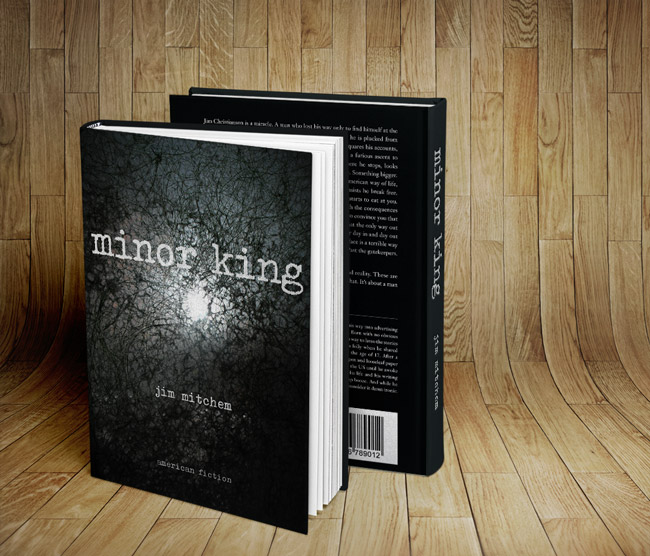According to my mother, advertising is evil. She cites false advertising as the culprit. “You see something in the newspaper and then you go to the store, and they do the ol’ bait and switch. That’s more than wrong. That’s evil.” When she found out that I had become a copywriter, she was cool with it. That is, until she learned that this meant that I wrote advertising. Since then, I may as well be a felon.

I grew up with the idea that advertising executives were evil sorcerers. Even on Bewitched, Larry and Darren were always trying to pull one over on their clients. And sometimes they used witchcraft. Case closed.
Back in 1996 when I was getting my life together, and with no set career direction, I decided to finish college to teach High School English. I needed 63 credits to graduate, and we only had enough money to last 11-months, so my wife worked two jobs and I attended three colleges concurrently to make it work. Prior to arriving at the school I’d eventually graduate from (University of North Florida), I was on a ‘writing emphasis’ track at a commuter college in New Jersey. UNF didn’t offer writing as a major, however, so in order to transfer as many credits as possible, I had to become a Literature major. I’d never had the patience to be a good reader, but love a good story – so I forced myself to read dozens of history’s greatest novels over those 11-months in order to get that damned degree. In filling out my class schedule, I took as many courses with the word ‘writing’ in the title as possible. Just as a way to stay fresh. A couple of those courses were Public Relations and Journalism, which all but turned me off to the idea of professional writing (so many rules), but one class was Copywriting. I had no idea what copywriting was at the time, but during that first class, I had an epiphany. I’ve had three epiphanies in my lifetime. The first one was when I quit drinking. The second was when I met my wife. And the third one happened while sitting that first class of Copywriting 101. I knew immediately that I was born to write advertising. And yet, it had nothing to do with being evil.
Like most creatives breaking into the workforce, I struggled to find a job after graduation. But no amount of rejection in Jacksonville, Florida, could slow my passion to write advertising that affected people and got results. I eventually went to work for an agency in Charlotte. Campaigns I wrote there even won the agency their first ever awards. Things didn’t work out there, however, (by the way, don’t ever believe them when they say, ‘we want to bring you on board to help take the creative in a new direction.’), and so yadda yadda yadda, eighteen months later in 2001, I launched one of the first ‘virtual’ ad agencies. I’ve since stopped soliciting on behalf of my agency and three years ago threw myself into Boxman Studios. Utilizing modern communications techniques, combined with effective storytelling and branding, we’ve taken Boxman from a ground floor concept to a company that works with international brands across North America. The combination of old school tactics and new school techniques have been pretty remarkable.
Over my career, I’ve worked for many brands and written many ads. And I have never once lied. Likewise, I’ve never once resorted to sorcery to get people to think differently about anything. I’ve only ever done my best to take the truth and make it as interesting as possible. Yes, I’ve employed hyperbole, but only to mock it. My point is that advertising isn’t evil. Not for me anyway. It never had to be. Maybe that’s because I absolutely believe that there’s a solution for every problem. And no credible solution ever includes deceit. This is not to say that there aren’t people who lie in their advertising. There are. In fact, for some people, deceit is a relevant tactic that they build their careers on. It comes down to numbers. Let’s say you own a pet store and you hire these guys and they say, “Free Puppy Food for Life” in an ad headline, but then effectively hide the legal context in tiny mouse print (you know, the part where they say that a puppy is no longer a puppy as soon as he’s altered, or something slick like that.) You experience a massive bump in the number of people who come through your door on a Saturday. Sure, most of these people want free dog food for life, and you can’t honor that, but that’s not important. What’s important is that people showed up and so these deceit guys will use those numbers as a successful case study for the next sucker, er, prospect they pitch.
No, deceit just isn’t for me. Mom would be proud. I even have certain markets that I won’t write for: fast food, alcohol and tobacco. Sure, fast food can change their menus to include healthy options, I’m just not down with the whole mass feeding of America thing. But just because Jim Mitchem isn’t soliciting his talents in these markets doesn’t mean others aren’t. There is definitely no shortage of clever people willing to help companies in these markets compete. And it’s perfectly fine. I have nothing against these people. Everyone loves french fries, whiskey and Skoal. Selling that stuff is easy. Someone’s got to do it.
Still, I like to think that I maintain something like an ethical standard in my work. I know it’s easy to poke holes in my thinking, and you will probably call me a hypocrite, but the fact is I don’t lie and I don’t sell my time to companies that I personally think do more harm than good for the human experience. As an ad writer, I’m pretty proud of this. Sure, I may die broke – but it would be irresponsible to use my powers for anything but good. Or rather, less bad.
Despite all this righteous bullshit, I can’t deny that advertising is a dark art. After a campaign I wrote for Lexus that went on to sell every vehicle the dealer had in its inventory, plus win a slew of awards back when I was a junior copywriter at that first agency, I noticed something inside of me rise up. Yes, ego was present – but ego is easy to recognize. No, this other thing was different. It was more subtle than ego. And more sinister. It introduced itself to me as a great power that could make people do pretty much anything I wanted them to do. And all it took for me to summon this power was a willingness to explore the hearts and minds of a target audience enough to discover what really makes them tick. What sets them off. What matters most to them. I’ve always been really good at rifling through a creative brief to create an ‘other’ in my mind who represents the target audience. Once you have that person created, you can have a meaningful dialogue with them. Through dialogue you gain trust. With trust comes a relationship and with that – an open window to their hearts. Once you have their hearts, getting them to do what you want is a seamless transition. Not unlike in real life. And so this is the place in the creative process where effective concepts are born – out of imaginary relationships in your mind with an ‘other’ who doesn’t exist, but who is so real that they may as well live next door. Over the course of my lifetime, I’ve lived in a lot of different places. Saying goodbye in the era of letter-writing was, at times, heart-wrenching. But between attending five high schools and then joining the USAF the summer I turned 18, I mastered the art of walking away from people. Of closing doors and never looking back. This skill has served me well in advertising. The ability to get to know imaginary people intimately, and then walk away from them completely has been helpful both professionally and psychologically. Still, I have never been able to shake the feeling that how I get people to see things differently is absolute manipulation – bordering on evil. Whether you like it or not, getting people to think or act a certain way is a powerful practice. And if you’re not careful, ego can easily take the reigns. And that’s never good.
Yes, there is a dark force at work in the minds of people who understand how to effectively mobilize masses. Maybe it is evil. Sometimes it sure feels that way. How else do you explain the ability to consistently say things in such a way so that almost any person acts favorably? The way justify it is that I’ve learned how to harness this dark energy in a manner that helps me do my job – without having to resort to outright deceit. Still I wonder, does that make me any different?

***

Jason Fox
Jul 16, 2012
Well said, as usual. Like many things in life, advertising is neither inherently good nor inherently evil. It is only its practitioners that make it so.
Cheryl Smithem
Jul 17, 2012
Nope, you’re not evil. Just incredibly perceptive. Understanding what others wants and needs are is the basis of effective advertising. What you get is that a story that hooks is more important than a gimmick. Gimmicks are a dime a dozen. Truth is far more rare. Like the finest perfume, it is alluring, rather than noxious.
I’ve also had people tell me that advertising is evil–that it provokes an insatiable desire. Sorry, I’m not having any of that. I’m in control of my own desires and if I read that my favorite jeweler is having something sparkly on sale and I want it, then it’s up to me to not purchase it if I don’t have the funds or need to use the money for something more fundamental.
The problem is that too many people expect their desires to be controlled by outside forces. Capiche?